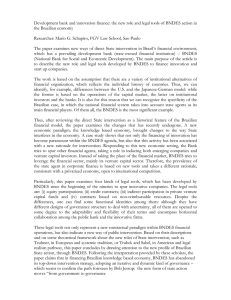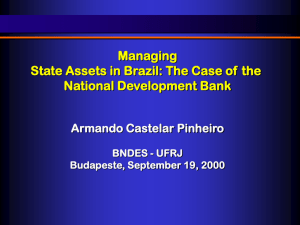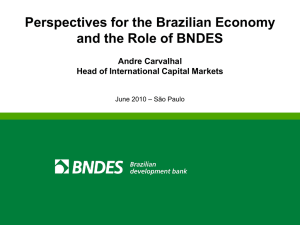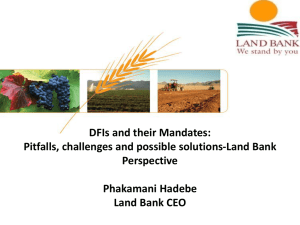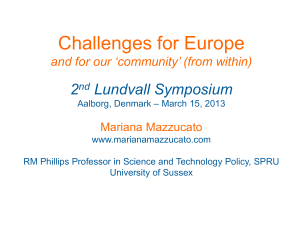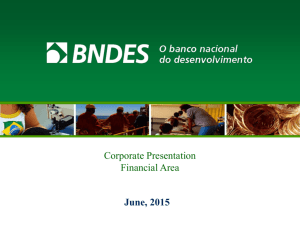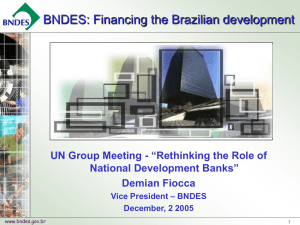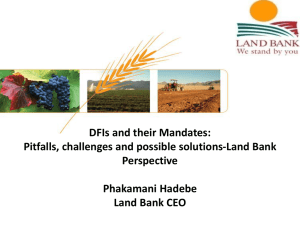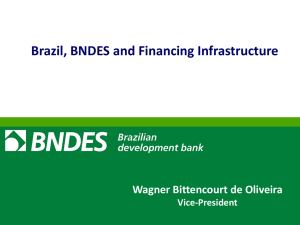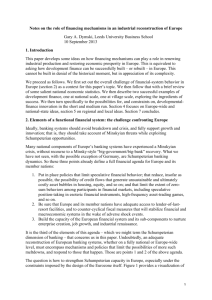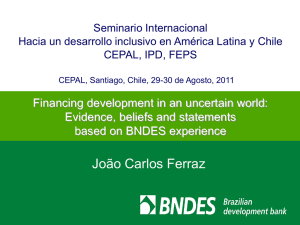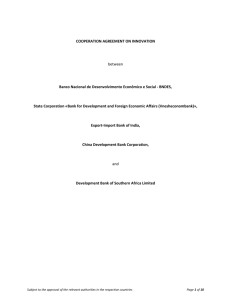BNDES at a glance
advertisement
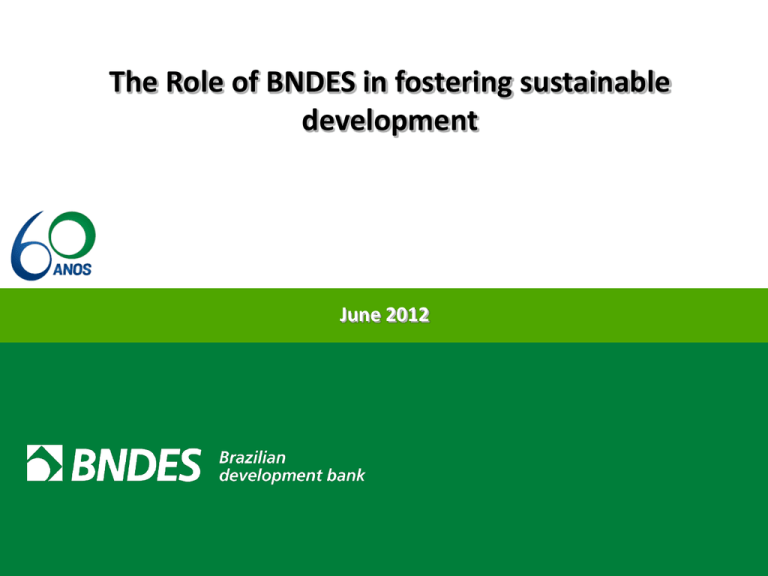
The Role of BNDES in fostering sustainable development June 2012 BNDES at a Glance Mission, Vision & Values Mission To foster sustainable and competitive development in the Brazilian economy, generating employment, while reducing social and regional inequalities. Vision To be the development bank of Brazil, innovative, outstanding, and to proactively tackle the current and relevant challenges of our society. Values Commitment to the country’s development, ethics, public spirit and excellence. BNDES development in time 50s 60s 70s 80s 90s 00s Today Infrastructure Heavy Industry – Consumer Goods Small and Medium-Sized Enterprises Technologic Development Imports Substitution Energy Agribusiness Social Inclusion and Environmental Issues Exports Adapting to the varied stages of Brazil´s development, having the means – resources and instruments - to accomplish mandates Privatization Program Urban and Social Development Innovation Sustainability Small Business BNDES as a promoter of sustainable development - Financial Resources For Sustainable Development 6 Instruments to suport sustainable development No que diz respeito à disponibilizar recursos para investimentos socioambientais, Linhas, Programas e Fundos são os instrumentos utilizados para a operacionalização da Política Socioambiental do BNDES. Atualmente, o BNDES apóia investimentos socioambientais por meio dos seguintes instrumentos: Linhas de Financiamento • Meio Ambiente • BNDES Florestal • Energias Renováveis • Projetos de Transporte Urbano • Eficiência Energética (Proesco) PROGRAMAS • BNDES Compensação Florestal • ABC e PRONAF • BNDES Procopa Turismo • BNDES Proplastico • BNDES Saúde • Saneamento Ambiental e Recursos Hídricos • BNDES Microcrédito • Projetos Multissetoriais Integrados (PMI) FUNDOS • PMAE Ambiental • BNDES Funtec e FEP • Investimentos Sociais de Empresas • BNDES Fundo Social e Cultural • Fundo Amazônia e Fundo Clima • FI Empresas Sustentáveis na Amazônia e Inovação em Meio Ambiente Instruments to suport sustainable development A atuação do BNDES no apoio a investimentos socioambientais ocorre de forma setorial e transversal e atende a diversos públicos, iniciativa privada, governo e sociedade civil: Governo Investimentos Sociais de Empresas e Microcrédito Construção Sustentável Eficiência Energética Eco-Eficiência Industrial Iniciativa Privada Recuperação de Passivo Ambiental Saneamento e Recursos Hídricos Desenvolviment o Institucional Aspectos SocioAmbientais Transversal Produção Sustentável Inovação Reflorestamento , Conservação e Regularização Florestal Outras Instituições Projetos Integrados: Infra-Estrutura e Serviços Sociais Básicos Melhoria de Gestão BNDES and Green Development BNDES’ Disbursements to the Green Economy (Amounts in US$ million) Sectors Renewable Energy Hydroelectric plants (above 30 MW) Renewable Energy - Other & Energy Efficiency Cargo Transport Public Transport Water and Sewage Management Solid Waste Management Forests Agricultural Improvements Adaptation to Climate Change and Disaster Risk Management Others Green Economy - Total 2008 2009 2010 2011 2,138 4,782 3,547 2,972 3,234 3,234 3,445 4,031 831 343 1,125 803 819 387 921 529 455 891 1,059 845 139 128 67 92 177 221 312 348 265 273 354 189 - - 81 351 61 7,397 49 11,373 39 10,301 94 10,557 2011 total disbursements: around US$ 80 billion US$/R$ = 1.75 Low Carbon Agriculture ABC Programme Created in 2010 – aims to mitigate and reduce greenhouse gas emissions in agriculture Financing for farmers and cooperatives with differentiated conditions US$ 1.9 billion in resources available for the 2011/2012 crop Incentives for techniques that guarantee efficiency in the fields Projected reduction of emissions for 2020: Between 130 and 160 million tons of CO2e Brazil´s Climate Fund Source of Funding > Main: Up to 60% share of the Special Participation of Petroleum received by the MMA > Potencial Sources: grants, loans, others. Resources 2011 $$ Grants: US$ 18 millions Concessional Loans: US$ 119 millions $ $ Ministry of the Environment Grants $ $ Operationalization: Ministry of Environment and BNDES Concessional Loans $ Objective of the Fund: to ensure funds $ $ $ Examples of Sectors: to support projects or studies aimed at promoting climate change mitigation and adapting to its effects. Renewable Energy Sustainable Production Activities: native wood producion, fruit and fiber Amazon Fund Aim: non-reimbursable investments in efforts to prevent, monitor and combat deforestation, and to foster the conservation and sustainable use of forests in the Amazon Biome. To achieve its objectives, the Amazon Fund supports projects in the following areas Donator Pledged Funds Goverment of Norway US$ 1 billion KfW Germany EUR 21 million Petrobras US$ 4 million I. Management of public forests and protected areas; II. Environmental control, monitoring and surveillance; III. Sustainable forest management; IV. Economic activities developed from the sustainable use of the forest; V. Ecological and economic zoning, land-use planning and land-title regulation; VI. Conservation and the sustainable use of biodiversity and; VII. Recovery of deforested areas. Disbursements: R$ 89,3 million Source of resources Fostering Energy Efficiency PROESCO Support to ESCO (Energy Service Companies) in projects that contribute to energy efficiency or substitute fossil fuels by renewable sources Attractive financial conditions Three approved projects in 2011 Reduction of energy consumption (estimative): 2.500 MWh per year Local Development: an opportunity and a responsibility A new approach to support large projects: focus on systemic implications of the territorial area of influence A broader concept of development Adaptability according to local reality Economic, social, environmental and territorial dimensions A better allocation of financial resources Extended partnerships and social control Systemic planning for development Land use planning 1 Economic development (e.g. supply chain, local productive and 5 Five Dimensions innovative arrangements, of Planning expansion of the income and labour effect) 4 Regional infrastructure / Social, environmental and cultural 2 development 3 Professional qualification Strengthening local management and labour training Economic research Examples of studies under development: Non-reimbursable resources for technical studies and research related to sustainable development Analysis of technologies for treatment and disposal of urban solid wastes in Brazil, Europe, Japan and US (coordinated by the Federal University of Pernambuco) Objectives: To support the development of public policies To direct BNDES’ strategic guidelines, priorities and policies Investigation of the potential effects in the Brazilian industry due to the adoption of low-carbon technologies by developed countries (coordinated by the University of São Paulo from Ribeirão Preto - Fearp/USP) BNDES Financial Support for Sanitation Investments Net exposure (US$ billion) Disbursements (US$ million) Sewage US$ 3.59 1,106 938 985 1,051 410 Water US$ 2.40 Drainage US$ 0.21 Waste US$ 0.13 283 140 122 129 179 2003 2004 2005 2006 2007 2008 2009 2010 2011 2012 Legal and administrative framework: Water Supply and Sewage (Federal Law Nº. 11,445/2007) and Solid Waste (Federal Law Nº. 12,305/2010). More than R$ 40 billion in public funds to support investments over the next 4 years Opportunities in Public-Private-Partnerships and Concessions: a large and open market for new (qualified) investorsar The support for SMEs Share of MSMEs in total disbursement 45% 41,4% 40% 35,9% 35% 31,8% 30% 25% 20% 15% 85.5% of townships with active operations with BNDES credit card for SMEs 24,8% 2007 24,0% 21,5% 2008 2009 * 2010 * 2011 up to march 2012 N° of MSMEs supported in 2011 250.000 235.984 200.000 176.678 150.000 BNDES Credit Card: 109.121 - 510,000 active cards - 2011: R$ 7.6 bi - 2012: R$ 11. bi (expected) 100.000 50.000 45.835 57.480 0 2007 Source: BNDES 2008 2009 2010 2011 17 The Role of BNDES in fostering sustainable development June 2012
